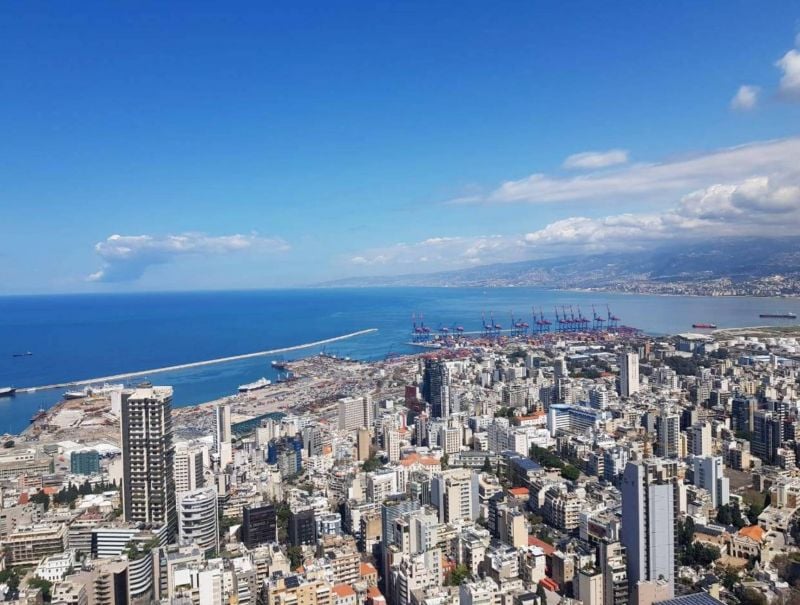
View of Beirut from Achrafieh. (Credit: Guillaume Boudisseau/ L'Orient Today)
The tourist boom of the summer seems a distant memory to those running AirBnB’s in Lebanon.
Between June and August 2023, 2.55 million passengers arrived at Beirut’s airport, marking a 15.75 percent increase compared to the same period in 2022. This influx of visitors enabled a thriving summer season in the country, which benefitted Lebanese businesses across sectors.
"The prices were on average 20 percent higher than in summer 2022 due to very high demand. Sometimes we had to subcontract or redirect clients to other companies," explained a spokesperson for the Lebanese online rental platform, More Than a Bed.
Founded in 2013, the More Than a Bed manages around 90 rental properties, nearly all in Beirut.
The deterioration of the security situation that followed the Israel-Hamas War, with its spillover into South Lebanon, has significantly impacted tourism in the country, consequently affecting its private rental market.
"During October and November alone, since the conflict's beginning, I counted 45 cancellations," testified Sam*, the owner of two AirBnB apartments he has been renting out since June 2022 in Beirut's Gemmayze district. Sam’s apartments were “fully booked 320 days out of 365,” but everything changed. "AirBnB is now dead and completely loss-making," he lamented. Since Oct. 7, his two rentals have remained vacant.
Alex, who manages 25 apartments in Beirut, also said he no longer receives any reservation requests.
More Than a Bed said they had an average occupancy rate of 30 percent in November, half of what is usual for them during this time of year where activity is at its lowest for the sector in Lebanon. "Many clients canceled their reservations for October, November and even December just days after the Gaza war began, especially as soon as Hezbollah started to get involved from South Lebanon," said the company's spokesperson.
For hotels, the situation is even worse. "The occupancy rate is currently between 0 and 5 percent," explained Pierre Achkar, president of the Hoteliers Syndicate in Lebanon. "Outside the capital, 50 percent of the hotels have closed their doors; in Beirut, there's more of a partial closure: each hotel's capacity is reduced by 70 to 80 percent," he added.
Is the situation tenable for those in the AirBnB market? According to Sam, "It's impossible without a second job." he received only two bookings for New Year's, but this gives him hope for a revival during the holiday season. Some rental requests in December prompted More Than a Bed to proceed cautiously. "Given the regional instability, we're taking things day by day."
Yet, the outlook remains bleaker for the traditional hotel sector. "The situation is disastrous. We don't expect improvement before early 2024," asserted Achkar. Before the conflict erupted, foreign investors, notably from Dubai, approached existing players in the local market with plans to acquire property in Lebanon for AirBnB rentals.
"This is unfair competition," said Pierre Achkar, who noted that Lebanon lacks laws to regulate the sector. "Anyone can rent out a property in Lebanon," explained More Than a Bed’s spokesperson. The absence of regulations means a lack pf access to verified statistics.
While the traditional hotel sector faces increasing vulnerability with the proliferation of temporary contracts that are easier to terminate, Sam is much less constrained. He manages everything himself: no maintenance team or operations. However, to rent out his two AirBnB properties, he invested in furniture, decor, appliances, solar panels, and 24/7 electricity, totaling around $30,000. "The first year covered my investments. After the summer, I was supposed to start saving," he explained.
With generators and electricity paid in advance, Sam's business is now completely in the red: $5,000 lost per month. And AirBnB doesn't want to upset its renters: "They called me every day asking for 100 percent refunds on each cancellation," sighed Sam. There were some requests, especially from displaced people from South Lebanon due to the Israel-Hamas war, but the Gemmayze property owner didn't entertain them. "I was afraid they might stay for too long."
most of More Than a Bed's current clients are "foreign journalists and Lebanese renting for occasions like parties or birthdays." This is not enough to sustain in the long run, although the platform claims it hasn't stopped paying salaries or laid off any employees.
Meanwhile, Alex has only reduced the working hours of some team members for now.
On its website, AirBnB did not issue advisories for foreign nationals to avoid or leave Lebanon.
Meanwhile, advisories from embassies resulted in the complete loss of three months of reservations for the traditional hotel sector. "We can't even speak of tourism anymore," lamented Achkar. The ceasefire provided a glimpse of recovery, now dismissed.
For Sam, now working full-time in his second job, the focus will be on the year-end holidays, with the arrival of tourists and expatriates. He's giving himself until early 2024 to decide if he will switch to renting long-term, similar to Alex, who considers it safer. "But in Lebanon, from one day to the next, we could be 'fully booked' again!"
*Names have been changed.
This article was originally published in French in L'Orient-Le Jour.